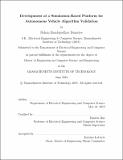Development of a simulation-based platform for autonomous vehicle algorithm validation
Author(s)
Banerjee, Rohan Bandopadhay.
Download1127390342-MIT.pdf (23.30Mb)
Other Contributors
Massachusetts Institute of Technology. Department of Electrical Engineering and Computer Science.
Advisor
Daniela Rus.
Terms of use
Metadata
Show full item recordAbstract
Developing robust algorithms for autonomous driving typically requires extensive validation and testing with physical hardware platforms and increasingly requires large amounts of diverse training data. The physical cost of these hardware platforms makes eld testing prohibitive, and the cost of collecting training data limits the size and diversity of this data. Autonomous driving simulation is a promising solution to address both of these challenges because it eliminates the need for a physical testing environment and because it oers environments that are congurable and diverse. However, most autonomous driving simulators are not fully useful for algorithm validation because they lack full integration with fundamental autonomous driving capabilities and because their sensor data is limited in functionality. In this work, we develop and present a simulation-based platform for testing and validation of autonomous driving algorithms that combines an open-source autonomous driving simulator (CARLA) with our existing autonomous driving codebase. Specically, we describe our software contributions to this platform, including simulated proprioceptive sensors and ground-truth LIDAR road information, and we demonstrate how we used the platform to validate both fundamental autonomous driving capabilities and a point-to-point navigation algorithm in simulation. We also describe how our platform was used to both develop and validate an approach to dynamic obstacle avoidance, a new capability in our codebase. Our platform is a capable tool for both validation and development of autonomous driving algorithms, although open directions remain in the areas of simulator sensor realism and runtime efficiency.
Description
This electronic version was submitted by the student author. The certified thesis is available in the Institute Archives and Special Collections. Thesis: M. Eng., Massachusetts Institute of Technology, Department of Electrical Engineering and Computer Science, 2019 Cataloged from student-submitted PDF version of thesis. Includes bibliographical references (pages 79-83).
Date issued
2019Department
Massachusetts Institute of Technology. Department of Electrical Engineering and Computer SciencePublisher
Massachusetts Institute of Technology
Keywords
Electrical Engineering and Computer Science.